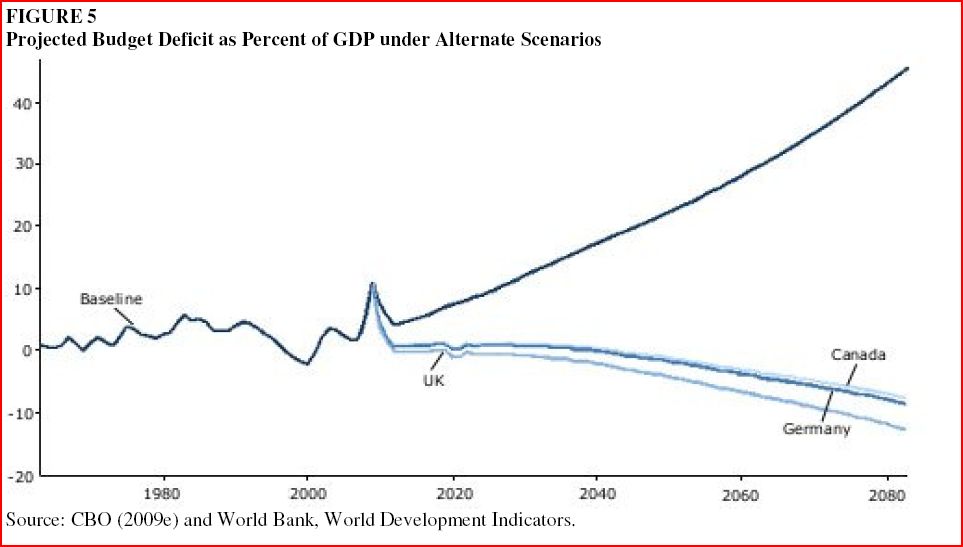Get this: Republicans on the Deficit Commission aren't just refusing to consider any tax increases. Now they're proposing tax decreases designed to help the rich while taking benefits from everyone else. Dealing with people like that is like negotiating with somebody who's high on drugs.
Most members of the Commission seem to want a deal -- any deal -- so they've decided not to address the real causes of current and future deficits: health costs, tax cuts, war spending, runaway bankers and the growing inequality between rich and poor. Instead they're going after something that doesn't affect the deficit: Social Security retirement benefits.
Why? Apparently, because they can.
Today's GOP is so extreme that it's rejecting a framework for Social Security endorsed by Ronald Reagan and Alan Greenspan. (They'd probably call Reagan a socialist if he were alive today.) And some Democrats are playing along.
The Deficit Commission was designed to show the world's financial markets that the US is serious about cutting its debt. Some of its members certainly offered chest-thumping, near-simian displays of "seriousness" when they met today. "It's not going to be easy, it's not going to be fun, and in many cases, it's not going to be popular," said Co-Chair Erskine Bowles. "It is going to require sacrifice."
In response, the markets yawned. They're not worried about US debt. (Only the politicians are.) What's more, the "market" -- usually so beloved by conservatives, but not in this case -- understands that the Commission's unlikely to propose anything that would seriously affect the deficit. When the radical right's driving the fiscal Crazy Train, it can't. So it's Social Security cuts or nothing. (The latter's not impossible. Commissioner Andy Stern said, "There has been absolutely no formulation" of recommendations.)
The reality is the Commission's not going to affect future deficits much either way. But if they're able to push their benefit cuts through Congress, they'll try to have it both ways politically. One the one hand, they'll insist that they're "only doing this to protect the program for future generations" and not to reduce the deficit. On the other hand, they'll also try to take credit for... reducing the deficit. Then they'll wait in vain for the financial markets to reward them for it.
Despite the fiscal illogic, Social Security cuts will in fact be both "easy" and "popular" in the high flying world where commissioners like Erskine Bowles reside. For Alan Simpson, they may even be "fun." And only the people they never see -- the ones who worked all their lives and paid their payroll takes -- will be called upon to "sacrifice."
To understand how wrongheaded they are, it's important to know what's really driving the deficit and what created the current mild imbalance in Social Security.
This is your budget. This is your budget on drugs.
Most people (even skeptics like me) assumed that, even in the worst-case scenario, the Budget Commission would try to temper the impact of its proposed cuts with a few symbolic tax hikes. Even if the increases were so tiny they were practically homeopathic, they'd have to do something for appearance's sake. That's what makes reading a news report like the one in today's Talking Points Memo so... so... hallucinogenic.
I know, I know: That's hardly a somber, analytical word. But, honest to God -- if you understand the numbers at all, reading a sentence like this will make you feel like your coffee's been laced with peyote. From Talking Points Memo:
"Republicans have not even said that we should get any revenue from taxes," the source said. "Even tax expenditures. They appear to want to use the savings on tax expenditures to cut corporate taxes."
You read that right: "Deficit" commissioners who won't allow any new tax revenues. Oh, they'd cut benefits for the elderly, alright, but they'd use the money to reduce corporate taxes -- and capital gains taxes, too. That will make the deficit worse and it will widen income disparity, further enriching the wealthy by cutting benefits that lower- and middle-income people paid taxes to provide all their lives. That's what passes for fiscal sanity in the econo-millenarian saucer cult the Republican Party has become. And that's how a nation that's already radically redistributed its wealth upward could do it even more.
Here's what Republican Sen. Judd Gregg, a member of the Commission, said today: "I think everybody understands that the majority of the issue is on the spending side, and so this commission, to the extent that it reports, I suspect is going to have a heavy tilt toward controlling spending."
But the GOP has ruled out cuts to the military or homeland security. That narrows the "spending" side of the equation down to about one-seventh of the budget. That brings us right back to raising taxes. The GOP response? "We need to change the conversation," said Sen. Bob Corker, "and I think that means focusing on the big picture first... agreeing on the amount of spending we can sustain."
"Changing the conversation," aka "changing the subject," is probably Corker's best bet. Because the deficit was really caused by this:
(source: Center for Budget and Policy Priorities)
That's two wars (which the GOP wants to continue), Bush-era tax cuts (which the GOP wants to expand to benefit the ultra-wealthy even more), and the direct and indirect costs of a crash brought on by inadequate banking regulation that enriched many of the same ultra-wealthy (the GOP is resisting all attempts to increase banking regulations.)
When it comes to deficits, the GOP is the problem, not the solution.
Sure, Social Security's a big-ticket item. But it's self-funded. If we went back to Reagan era principles, it would be fine. There's not much out there to cut, proportionally, except health-care spending. Our health-care costs are far above those of other developed nations and give us much poorer results. What if we could get our health spending in line with countries like Canada, the United Kingdom, or Germany? Thanks to Dean Baker at the Center for Economic and Policy Research, we have the answer:
If we get our costs more in line with those countries, we can restore the American dream and balance the budget. All we have to do is have a public health-care system -- either as a national health insurance model or, as with Germany, a system that combines public and private funding programs run on sound principles. (It's been running fine since Otto von Bismarck's day.) But we couldn't even get a fairly milquetoast public option past the "deficit hawks," even though it would reduce the deficit.
Right. "Deficit-hawk" Republicans, along with "centrist" allies like Democratic Senator Ben Nelson, killed a program that would have reduced the deficit. But Ben Nelson's got a reputation as a sound, sensible guy. He's not a day-tripping psychedelic conservative. Surely he must have realized the futility of trying to deal with economic extremists by now. What sort of sensible things does Ben Nelson have to say about deficit reduction?
"I suggested holding a private (bipartisan) discussion, free of posturing and playing to the cameras, perhaps at Camp David. If that setting could lead to the Camp David accords, why not the Camp David agreements?"
"Excuse me while I kiss the sky," the Senator should have added.
You know what other bipartisan group shies away from cameras in order to cut a deficit deal? The Deficit Commission! They can't get a sensible deal because you can't negotiate with people who are living in a hallucination. Remember, these are the same folks who called a proposal to provide counselors for the dying a "death panel" plan -- and it was offered by a fellow Republican! As for the office of "National Coordinator of Health Information Technology" (which, by the way, is one of my dream jobs), one conservative described it as Obama's plan to "take us... into the Matrix." The problem? The job was actually created by George W. Bush.
Oops. But that's the way the right is these days: Where others see sober, serious, genuinely bipartisan proposals based on common sense, they see Morpheus in The Matrix asking Neo to choose the red pill or the blue pill. The idea of "bipartisan" negotiation in this atmosphere makes about as much sense as taking both pills at once and thinking you'll see things more clearly.
Alan Greenspan: Not Randian Enough?
As for Social Security, the Greenspan Commission was appointed by Ronald Reagan and Congress to fix its fiscal problems, which really were severe back then. What changed?
In a word, income inequality. The disparity between the rich and everybody else became far worse than the Commission expected. That's right: Even Alan Greenspan couldn't imagine what an economically inequitable country we were about to become. As economist L. Josh Bivens reported, wage growth slowed dramatically and income inequality rose sharply after the 1980s. The cap on payroll taxes is calculated based on the increase in average wages, but more people are on the low end of the earning curve nowadays. That leaves the wealthy paying an ever-decreasing proportional share of their income to support Social Security. As Bivens noted in 2005, 75% of the projected shortfall was due to this shift.
Congress under Reagan intended to tax 90% of all wages, and if we returned to that goal most of the long-term imbalance would disappear. If the cap were lifted altogether, the program would be 100% solvent forever. Income disparities have grown even greater since 2005, and the tax structure for Social Security should be adjusted to reflect that. After all, the United States was a more economically-balanced country under Ronald Reagan than it is today. (Turns out it really was "morning in America." Who knew?)
We Gave Peace a Chance
Look, we applaud the principle of comity, collaboration and bipartisanship. But there's no opportunity for a deal if the other party is all give and no take. That's Negotiation 101. And in this case they're "out there," too. Negotiation sessions with them aren't serious, much less "sober." They're more like a blind date with someone who seems nice enough during dinner, but starts explaining over dessert that aliens are talking to us through our wristwatches.
All attempts at compromise have been met with wild-eyed rhetoric. Every extended hand has either been slapped or used to pick its owner's pocket. Face it: It's not working. This isn't a negotiation, it's a hostage negotation with some very odd people. And seniors are the hostages.
In recognition of this reality, a a number of representatives and senators are planning to hold the line on Social Security by pledging to resist any attempt to cut benefits. (An announcement's expected tomorrow.) With elections coming up, this is a perfect time to present this difference of opinion... a difference of realities, really... to the voters.
As for the right, it's still encased in a trippy dreamscape where tax cuts increase revenues, rich people's money trickles down like fairy dust, and markets never crash. It's time somebody told them the truth:
The dream is over.
Richard (RJ) Eskow, a consultant and writer (and former insurance/finance executive), is a Senior Fellow with the Campaign for America's Future. This post was produced as part of the Strengthen Social Security campaign. Richard also blogs at A Night Light.
He can be reached at "rjeskow@ourfuture.org."
Website: Eskow and Associates


